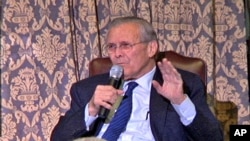Donald Rumsfeld holds the distinction of being the second-longest serving Secretary of Defense in U.S. history. His most recent tenure as the civilian head of military forces began in the months before the 9/11 terrorist attacks, and ended just after the 2006 U.S. midterm elections. Under President George W. Bush, he oversaw the invasions of Afghanistan and Iraq, and in a new memoir he opens up about the decisions and missteps involved in those military operations.
Rumsfeld admits one of the lowest points of his professional career came in 2004, when photographs surfaced showing U.S. military service members mistreating prisoners at the Abu Ghraib prison in Iraq.
"And then out of the blue come these photographs… just heartbreaking. It is like you have been punched in the stomach. And you think to yourself here are these wonderful young men and women in our service, and their reputations are stained by the people who abused those people that were in our custody. It was disgraceful, it was perverted, it was disgusting, it was heartbreaking, and I was just sick about it," he said.
Intense international condemnation of the abuse, and public scrutiny on how the Secretary of Defense was handling the allegations, led to the first of several instances in which Rumsfeld submitted his resignation to President George. W. Bush. "He rejected it, and the next day or three days later. I submitted it again and told him I thought that was a mistake and that I should leave. Someone’s head ought to roll," Rumsfeld said.
In his new memoir, Rumsfeld maintains that President Bush was wrong for not accepting his resignation in the wake of the scandal. "I personally in retrospect think it would have been the right thing to do and that I was right and he was wrong," he said.
Speaking at the Union League Club in Chicago, Rumsfeld noted several familiar faces in the crowd who helped him throughout his political career, which began in 1962, when he ran for a Congressional seat in Illinois. He went on to serve as Chief of Staff to President Gerald Ford, and Secretary of Defense for Mr. Ford and later George W. Bush.
The title of his memoir, Known and Unknown, is taken from a Pentagon press briefing in February 2002, when Rumsfeld answered a reporter’s question about the links between terrorist organizations and Saddam Hussein.
"There are known knowns; there are things we know we know. We also know there are known unknowns; that is to say we know there are some things we do not know. But there are also unknown unknowns - the ones we do not know we do not know," he said in the news conference.
A year after those remarks, the U.S. led an invasion of Iraq, based in part on faulty intelligence that Saddam Hussein had chemical weapons. Rumsfeld says he was convinced the intelligence was correct based on the convictions of those he talked to.
"I remember meeting with President Mubarak of Egypt and he said you can be absolutely certain Saddam Hussein will use chemical weapons against U.S. forces and coalition forces the closer you get to Baghdad. And this was the conviction all across the region," he said.
"You all heard Colin Powell’s speech at the United Nations. Here is a man who dealt with intelligence materials all his adult life. Probably had more background and experience than anyone, and made his presentation to the United Nations and the world on behalf of the country with absolute conviction that what he was saying was correct," he said.
Rumsfeld admits there was widespread disappointment that no weapons of mass destruction were found. The convincing intelligence has in recent years been discredited.
But Rumsfeld says he has no regrets about the decision to go to war in Iraq, and does not regret later decisions to disband the Iraqi army.
He also continues to support the so-called "de-Baathification" process of the Iraqi government, which removed Saddam Hussein’s supporters from government positions. Both moves fueled the subsequent insurgency in Iraq.
"How it was administered I think was the problem, not the decision to have a de- Baathification process. I think that was the right decision. How it was administered by a man named Ahmed Chalabi, a Shia, was probably - had the effect of making a lot of Sunni’s feel like they were not going to be a part of the new Iraq. And you can not have that," he said.
The U.S.-led coalition in Iraq did achieve its goal of removing Saddam Hussein from power. The deposed leader was eventually found in 2003. He was tried in an Iraqi court, and executed in December 2006.
But the fight against terrorism in Afghanistan continues, almost 10 years since it began under Rumsfeld’s watch in October of 2001. One of the highest-value targets on the list of those still evading capture by U.S. forces is Osama Bin Laden. Rumsfeld says even though he is not in custody, his power and influence is diminished.
"He is having trouble communicating. He is having trouble traveling. I hope he is having trouble recruiting. I hope he is having trouble raising money. And I hope somebody in the world finds him," he said.
He left the Cabinet post of Secretary of Defense in 2006, after Republicans lost a majority in both houses of Congress in the November mid-term elections. That defeat was, in part, fueled by anger over the lack of progress in the war in Iraq, and the rising number of troop casualties.
Rumsfeld now lives in the western U.S. state of New Mexico. He says he is donating the profits from his book sales to military charities supported by his foundation.
Rumsfeld: Bush Was Wrong for Not Accepting Resignation
